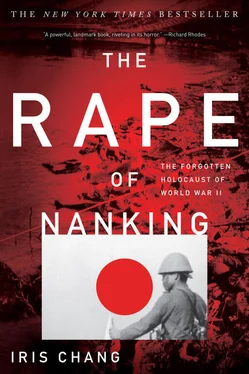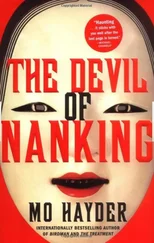We did not find a single Japanese patrol either in the Zone or at the entrances!
Yesterday, in broad daylight, several women at the Seminary were raped right in the middle of a large room filled with men, women and children! We 22 Westerners cannot feed 200,000 Chinese civilians and protect them night and day. That is the duty of the Japanese authorities. If you can give them protection, we can help feed them!
If this process of terrorism continues, it will be next to impossible to locate workers to get the essential services started.
Gradually Rabe and the rest of the International Committee begin to read the real message in the diplomat’s answers—it was the military, not the embassy, calling the shots. Fukuda Tokuyasu, secretary of the Japanese embassy, told Rabe as much by saying: “The Japanese army wants to make it very bad for the town, but we, the embassy, will try to prevent it.” During the great Rape some Japanese embassy officials actually suggested that the International Committee seek publicity in Japan directly so that public opinion would force the Japanese government to take action. But at the same time another embassy official urged Rabe to remain silent, warning him that “if you tell the newspaper reporters anything bad, you will have the entire Japanese army against you.”
Finally, with only his status as an official of an allied nation for protection, Rabe did what now seems the unthinkable: he began to roam about the city, trying to prevent atrocities himself.
Whenever he drove through Nanking, some man would inevitably leap out and stop the car to beg Rabe to stop a rape in progress—a rape that usually involved a sister, a wife, or a daughter. Rabe would then let the man climb into the car and direct him to the scene of the rape. Once there, he would chase Japanese soldiers away from their prey, on one occasion even bodily lifting a soldier sprawled on top of a young girl. He knew these expeditions were highly dangerous (“The Japanese had pistols and bayonets and I… had only party symbols and my swastika armband,” Rabe wrote in his report to Hitler), but nothing could deter him from making them—not even the risk of death.
His diary entry on January 1, 1938, is typical: “The mother of a young attractive girl called out to me, and throwing herself on her knees, crying, said I should help her. Upon entering [the house] I saw a Japanese soldier lying completely naked on a young girl, who was crying hysterically. I yelled at this swine, in any language it would be understood, ‘Happy New Year!’ and he fled from there, naked and with his pants in his hand.”
Rabe was appalled by the rape in the city. In the streets he passed scores of female corpses, raped and mutilated, next to the charred remains of their homes. “Groups of 3 to 10 marauding soldiers would begin by traveling through the city and robbing whatever there was to steal,” Rabe wrote in his report to Hitler.
They would continue by raping the women and girls and killing anything and anyone that offered any resistance, attempted to run away from them or simply happened to be in the wrong place at the wrong time. There were girls under the age of 8 and women over the age of 70 who were raped and then, in the most brutal way possible, knocked down and beat up. We found corpses of women on beer glasses and others who had been lanced by bamboo shoots. I saw the victims with my own eyes—I talked to some of them right before their deaths and had their bodies brought to the morgue at the Kulo hospital so that I could be personally convinced that all of these reports had touched on the truth.
As he walked through the burning wreckage of his beloved city, Rabe could read, on almost every street corner, beautiful Japanese posters that proclaimed: “Trust Our Japanese Army—They Will Protect and Feed You.”
Determined to save Chinese lives, Rabe sheltered as many people as he could, turning his house and office into sanctuaries for Siemens employees and their families. Rabe also harbored hundreds of Chinese women on his property, permitting them to live in tiny straw huts in his backyard. With these women Rabe developed a warning system to protect them from Japanese rapists. Whenever Japanese soldiers scaled the wall of his yard, the women would blow a whistle and send Rabe running out into the yard to chase the offenders away. This happened so frequently that Rabe rarely left his home at night, fearful that Japanese intruders would commit an orgy of rape in his absence. He complained about the situation to Japanese military officers, but they failed to take the matter seriously. Even when Rabe caught a Japanese soldier raping a woman in one of the backyard straw huts, a military officer did nothing to punish the rapist except slap him across the face.
If Rabe was frustrated by the futility of the situation—by the limitations of what he and some twenty other individuals could accomplish to protect hundreds of thousands of civilians from more than fifty thousand Japanese soldiers—he did not show it. He knew it was crucial to hide any sign of weakness from the Japanese and to overwhelm them with “a domineering presence and energy.”
Fortunately, his status as a Nazi caused several Japanese soldiers to hesitate before committing further mayhem—at least in his presence. George Fitch, the local YMCA secretary, wrote that “when any of them objects [Rabe] thrusts his Nazi armband in their face and points to his Nazi decoration, the highest in the country, and asks them if they know what that means. It always works!” The Japanese soldiers appeared to respect—at times even fear—the Nazis of Nanking. While the Japanese privates did not hesitate to beat up the Americans, charge at them with bayonets, or even to push one American missionary down a flight of stairs, they exercised considerable restraint in their dealings with Rabe and his countrymen. Once, when four Japanese soldiers in the midst of raping and looting saw Eduard Sperling’s swastika armband, they screamed “Deutsche! Deutsche!” and ran away. On another occasion, the swastika probably saved Rabe’s life. One evening Japanese soldiers broke into his property, and Rabe confronted them with his flashlight. One of them reached for his pistol, as if to shoot Rabe, but stopped when he realized it would be “bad business to shoot a German subject.”
If the Japanese respected Rabe, the Chinese refugee community revered him. To them he was the man who rescued daughters from sexual slavery and sons from machine-gun fire. Rabe’s very presence sometimes touched off riots in Safety Zone camps. During one of his visits to the zone, thousands of Chinese women flung themselves to the ground before him, weeping and begging for protection, declaring they would rather commit suicide on the spot than leave the zone to be raped and tortured.
Rabe tried to keep hope alive for his refugees in the midst of their terror. He hosted little birthday celebrations for the children born to refugee women living in his backyard. Each newborn received a gift: $10 for baby boys and $9.50 for baby girls. (As Rabe explained in his report to Hitler—“Girls in China aren’t worth as much as boys.”) Typically, when a boy was born, he received Rabe’s name, and if a girl was born, she received his wife’s name, Dora.
Rabe’s courage and generosity ultimately won the respect of the other members of the International Committee, even those fundamentally opposed to Nazism. George Fitch wrote to his friends that he would “almost wear a Nazi badge” to keep fellowship with Rabe and the other Germans in Nanking. Even Dr. Robert Wilson, a man thoroughly repulsed by Nazism, sang Rabe’s praises in letters to his family: “He is well up in Nazi circles and after coming into such close contact with him as we have for the past few weeks and discover[ing] what a splendid man he is and what a tremendous heart he has, it is hard to reconcile his personality with his adulation of ‘Der Fuhrer.’ ”
Читать дальше











